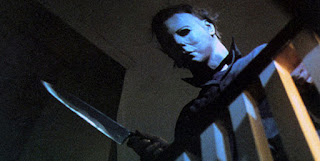This is probably the most intimidating
analysis I could ever dream of doing. I don’t think there is a
single aspect of Halloween that hasn’t been examined,
re-examined, ranted on and generally picked apart. I honestly feel
like its status as a classic almost compels other people over-analyze
what’s fundamental to the story of a small child who went crazy,
became catatonic, and years later, escaped from a mental institution
and came back to his home to kill anyone in the general vicinity,
mostly baby-sitting teenagers.
If I had to offer up my two cents, I
would have to say that it popularized ‘The Other’ as the villain;
something that was initially perfected by Black Christmas.
(In fact, I would argue that Black Christmas did a better job
of it.) It’s been said (I believe by John Carpenter himself) that
there are only two horror stories: “the evil is out there,” and
“the evil is in there.” Either evil is the ‘Other,’ the
terrifying force that fights against us, or evil is our own savage
human nature.
The slasher film is the epitome of the
former, and I feel that is part of why it’s so looked down upon. I
can understand why; viewing evil as something that comes purely from
without could be seen as an incredibly simplistic way of looking at
the world. However, such simplicity is far too often underrated for
its ability to elicit terror.
Michael Myers (Nick Castle), before
being retconned by the sequels into Laurie Strode’s (Jamie Lee
Curtis’) long-lost brother, was pure ‘Other.’ The closest
conceivable connection he had to any of the characters was that he
happened to have been born in the same town as them. He was human in
only the broadest sense of the word.
The movie is very different if its
sequels are considered. While I enjoy the sequels, I think the movie
is most frightening as a standalone piece. Later films make Laurie
out to be some sort of rival for Michael, whereas in this film, her
survival is due to a mixture of spunk and luck, and Michael has no
interest in any connection or rivalry.
Of course, no review of this film is
complete without a discussion of Dr. Sam Loomis (Donald Pleasence),
the one person who knew what Michael was before his escape. As with
Michael himself, Dr Loomis is a simple character, but effective in
his simplicity. He sees Michael as a pure evil that must be
destroyed, and is seen by everyone else as a raving madman. So
knowing him to be correct, his fear becomes our own.
There’s endless debate about the
ending of the movie. Whether Michael’s death at the end of
Halloween II was the proper ending to the series, or if it was more
horrifying to simply leave the ending open, knowing that he was still
out there, and would return. For my money, while I appreciate most
of the sequels for what they are, I prefer the ambiguity. Michael is
a force of nature, the ending should have been left at that.

No comments:
Post a Comment